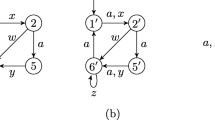Abstract
Realizability – checking whether a specification can be implemented by an open system – is a fundamental step in the design flow. However, if the specification turns out not to be realizable, there is no method to pinpoint the causes for unrealizability. In this paper, we address the open problem of providing diagnostic information for realizability: we formally define the notion of (minimal) explanation of (un)realizability, we propose algorithms to compute such explanations, and provide a preliminary experimental evaluation.
Preview
Unable to display preview. Download preview PDF.
Similar content being viewed by others
References
Abadi, M., Lamport, L., Wolper, P.: Realizable and unrealizable specifications of reactive systems. In: Ronchi Della Rocca, S., Ausiello, G., Dezani-Ciancaglini, M. (eds.) ICALP 1989. LNCS, vol. 372, pp. 1–17. Springer, Heidelberg (1989)
European Railway Agency. Feasibility study for the formal specification of ETCS functions. Sep, Invitation to tender (2007), http://www.era.europa.eu
Behrmann, G., et al.: UPPAAL-Tiga: Time for playing games! In: Damm and Hermanns [11], pp. 121–125.
Bloem, R., et al.: RAT: Formal analysis of requirements. In: Damm and Hermanns [11], pp. 263–267.
Bloem, R., et al.: Interactive presentation: Automatic hardware synthesis from specifications: A case study. In: Lauwereins, R., Madsen, J. (eds.) DATE, pp. 1188–1193. ACM Press, New York (2007)
Bontemps, Y., Schobbens, P., Löding, C.: Synthesis of open reactive systems from scenario-based specifications. Fundam. Inform. 62(2), 139–169 (2004)
Clarke, E., et al.: NuSMV: A new symbolic model verifier. In: Halbwachs, N., Peled, D.A. (eds.) CAV 1999. LNCS, vol. 1633, pp. 495–499. Springer, Heidelberg (1999)
Cimatti, A., et al.: Diagnostic information for realizability. Technical Report FBK-092007-01, Fondazione Bruno Kessler (2007), http://es.fbk.eu/people/roveri/tests/vmcai08
Cimatti, A., et al.: Boolean abstraction for temporal logic satisfiability. In: Damm and Hermanns [11], pp. 532–546
Clarke, E., Veith, H.: Counterexamples Revisited: Principles, Algorithms, Applications. In: Dershowitz, N. (ed.) Verification: Theory and Practice. LNCS, vol. 2772, pp. 208–224. Springer, Heidelberg (2004)
Damm, W., Hermanns, H. (eds.): CAV 2007. LNCS, vol. 4590. Springer, Heidelberg (2007)
Groce, A.: Error Explanation and Fault Localization with Distance Metrics. PhD thesis, Carnegie Mellon University (2005)
Lynce, I., Marques Silva, J.: On computing minimum unsatisfiable cores. In: SAT (2004)
Pill, I., et al.: Formal analysis of hardware requirements. In: Sentovich, E. (ed.) DAC, pp. 821–826. ACM Press, New York (2006)
Pnueli, A., Piterman, N., Sa’ar, Y.: Synthesis of Reactive(1) Designs. In: Emerson, E.A., Namjoshi, K.S. (eds.) VMCAI 2006. LNCS, vol. 3855, pp. 364–380. Springer, Heidelberg (2005)
Pnueli, A., Rosner, R.: On the synthesis of a reactive module. In: 16th Annual ACM Symposium on Principles of Programming Languages, pp. 179–190 (1989)
Safra, S.: On the complexity of omega-automata. In: FOCS, pp. 319–327. IEEE, Los Alamitos (1988)
Tripakis, S., Altisen, K.: On-the-Fly Controller Synthesis for Discrete and Dense-Time Systems. In: Wing, J.M., Woodcock, J.C.P., Davies, J. (eds.) FM 1999. LNCS, vol. 1708, Springer, Heidelberg (1999)
Yoshiura, N.: Finding the causes of unrealizability of reactive system formal specifications. In: SEFM, pp. 34–43. IEEE Computer Society Press, Los Alamitos (2004)
Author information
Authors and Affiliations
Editor information
Rights and permissions
Copyright information
© 2008 Springer-Verlag Berlin Heidelberg
About this paper
Cite this paper
Cimatti, A., Roveri, M., Schuppan, V., Tchaltsev, A. (2008). Diagnostic Information for Realizability. In: Logozzo, F., Peled, D.A., Zuck, L.D. (eds) Verification, Model Checking, and Abstract Interpretation. VMCAI 2008. Lecture Notes in Computer Science, vol 4905. Springer, Berlin, Heidelberg. https://doi.org/10.1007/978-3-540-78163-9_9
Download citation
DOI: https://doi.org/10.1007/978-3-540-78163-9_9
Publisher Name: Springer, Berlin, Heidelberg
Print ISBN: 978-3-540-78162-2
Online ISBN: 978-3-540-78163-9
eBook Packages: Computer ScienceComputer Science (R0)




